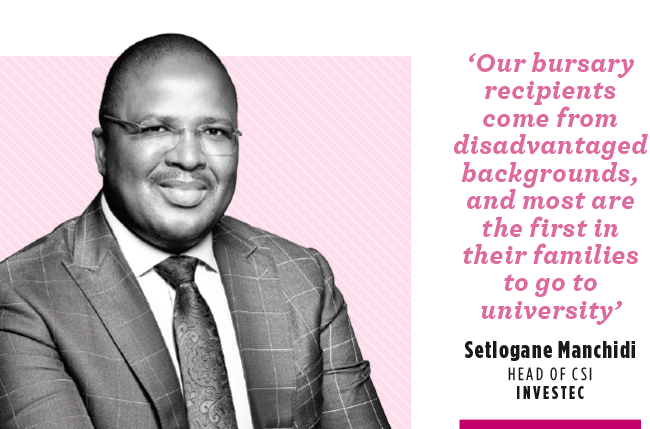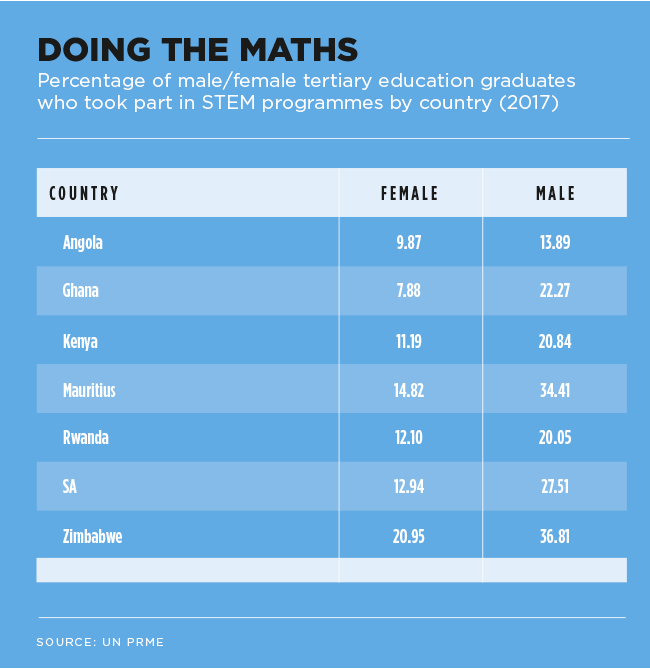Science, technology, engineering and maths (STEM) skills are among the most sought-after currently when it comes to employment. Employees favour these abilities because STEM subjects lay a foundation for critical thinking and problem-solving, and build competency and literacy in what is fast becoming the language of the world.
Robert Zwane, senior executive of national imperatives at the South African Institute of Chartered Accountants (SAICA), says that for scarce-skills professions such as chartered accountancy, bridging the shortcomings in SA’s education system is a strategic priority, and it is not up to government alone to tackle this. ‘To address the problems relating to quality education and skills development, we need to collaborate on programmes that pool together our knowledge and skills,’ he says. This is especially true when it comes to maths, he adds, and we need to stress the message to youths that ‘maths matters’.
SAICA’s Thuthuka initiative, launched in 2002, is now a well-established and very successful national transformation scheme, running more than 40 projects annually. Consisting of two parts – the Thuthuka Education Upliftment Fund (TEUF) and the Thuthuka Bursary Fund (TBF), the programme has reached more than 1 million learners. The TEUF provides education-focused and community-based projects to learners and educators from previously disadvantaged backgrounds with the dual aim of encouraging learners at high school to take maths as a subject and improving the pass rate of this gateway subject. Among the key school programmes are accounting olympiads, business roadshows and symposiums, and development camps for maths and accounting skills.
The TBF provides full financial support to learners selected for the programme, along with academic support and access to additional tutorials, life-skills training, workplace readiness and study skills. It has proven an extremely successful model, with more than 900 students supported in 2018 alone.
SAICA also places great emphasis on mentoring. ‘Mentoring in its very nature involves the process of handing down life experience between an experienced individual and a developing one,’ says Zwane. ‘From a business perspective, this is crucial, as it gives current leaders the opportunity to develop future ones.’ SAICA is passionate about the ‘lift as you climb’ approach, explains Zwane, and thus mentoring is built into the Thuthuka’s holistic student-support model. ‘This ensures that beneficiaries throughout the qualification pipeline hand down their experiences to their juniors. We find that this is most impactful as it ensures that newly qualified CAs support trainee CAs, trainees support students, and students support learners. This top-down type of “family approach” to mentorship also ensures that those who are one step higher on the qualification ladder support those on the rung below them.’
Deloitte offers several programmes aimed at high school and university students, as well as graduate programmes for actuarial sciences, chartered accountancy and data science. ‘We help students understand that being an engineer, mathematician, statistician, economist or various other STEM professions could lead to exciting opportunities in the professional services field,’ says Deloitte managing partner (Africa talent and transformation) Justine Mazzocco. Among the company’s initiatives is a tutorship programme, Project Siyakhula, which sees Deloitte professionals tutor maths and accounting to Grade 10, 11 and 12 learners from schools in Ivory Park, and the Young Executives Programme, a two-day initiative that introduces high school learners to a career in chartered accountancy. Deloitte also offers a bursary programme, spending more than R16 million per annum on direct bursaries to learners already studying towards a chartered accountancy qualification.
Valuing the significance of science and maths education at high school level, Investec supports both the Promaths initiative and a maths and science teacher internship programme called SAMSTIP. Now in its 15th year, Promaths aims to facilitate maths and science lessons for learners. To date, more than 8 000 school children from township and rural areas have been through the programme, many of them achieving exceptional results. In 2019, out of the 1 392 learners who matriculated from Investec-funded Promaths centres, 224 distinctions in maths and 459 distinctions in science were achieved.
Investec also has a bursary scheme, in partnership with Study Trust. There are currently 100 students on full-cost bursaries at various universities across SA. Investec bolsters this with mentorship, pairing each bursary recipient with an Investec employee. Setlogane Manchidi, Investec’s head of CSI, says this increases students’ chances of making a success of their studies. Calling mentorship ‘a very powerful tool’, Manchidi says that ‘our bursary recipients come from disadvantaged backgrounds, and most are the first in their families to go to university. While that’s a wonderful opportunity, it’s a daunting transition that comes with a host of unique challenges. We provide each bursary recipient with a mentor who has experienced university life, who has travelled a similar path, and who can guide them through the changes and obstacles they may encounter’.
Doing its bit to secure the talent pipeline, Absa runs a three-year articles programme, accredited by SAICA and Chartered Institute of Management Accountants, targeting university-level students. The bank recruits eight to 10 top graduates from leading universities every year. Trainees rotate on an eight-month cycle across various business divisions within the bank, while first-year trainees form part of the group-wide GenA Grad programme, through which they are exposed to diverse training summits, including presenting banking solutions to colleagues in Africa.
Networking with senior leadership is a key component, and the trainees have regular opportunities to interact with Absa executives such as Jason Quinn and Peter Matlare, who share their experiences. Trainees are also involved in several events during the year, including ProgenY, the UN Youth Assembly, Women in Banking and the Financial Services Topp Programme Committee.
In February this year, 56 graduates with university degrees aligned to the demand in the financial sector completed an internship registered with the Insurance Sector Education and Training Authority (INSETA), thanks to Alexander Forbes, and a cohort of 38 new graduates were registered on the programme. Seven of these graduates also completed the Association for Saving and Investments’ work-readiness programme, which is tailored to the investment industry. Its aim is to equip graduates with the necessary skills and competencies to springboard their careers in the financial sector, the firm says.
As for bursaries, Alexander Forbes is this year placing a higher emphasis on bursaries for female unemployed youths and focusing bursaries on actuarial science and accounting, investments, economics, financial planning and applied maths, along with IT qualifications in data analytics, AI and robotics.
Global payments company Mastercard recently launched its first 2020 SA Girls4Tech programme in Johannesburg, to encourage girls to pursue careers in science and technology. It includes STEM-relevant topics such as digital convergence, cryptology and algorithms. Since its launch in April 2014 in the US, Girls4Tech has reached more than 500 000 girls across 27 countries, including at least 1 000 girls in SA. The ultimate goal is to reach 1 million girls globally by 2025. Additional initiatives will be rolled out in Johannesburg and Cape Town schools this year.
It’s a fact that fewer females enter careers in STEM fields than males. Commenting on this, Zwane says: ‘Historically, certain professions, including chartered accountancy, have been seen as “male-dominated”, but through our Thuthuka efforts and SAICA’s commitment to gender equality, we have slowly seen our membership demographics for students entering into CA-stream BCom degrees, and indeed the two SAICA qualifying examinations, shift closer to a 50/50 intake of men versus women.’
Mazzocco says Deloitte’s statistics indicate that 58% of graduates hired into the firm’s audit and advisory business are female. Just more than 25% of the total are African females. ‘The most crucial consideration needs to be not accepting a status quo of there not being enough people in the industry but rather actively working to change it, utilising our best people in solving the challenge.’
With so many organisations working hard to avert a future skills shortage in the finance sector, it is important not to work in silos; collaboration is crucial. But, for these efforts to be most effective, says Manchidi, interests must be aligned.
‘There are numerous reasons to collaborate, not least of which is the fact that no single corporate entity can address the myriad social needs in South Africa, or indeed anywhere in the world, single-handedly,’ he says. ‘However, partnering with the wrong organisation, for the wrong reasons, can be detrimental to the desired impact.
‘Meaningful collaboration requires that the purpose and vision of those collaborating be aligned. If all partners are not aligned in purpose and motive, then the potential value of the collaboration will surely be destroyed.’











